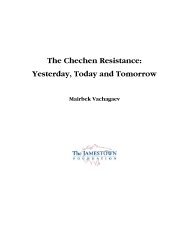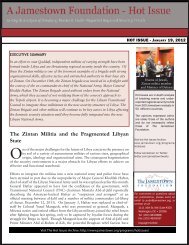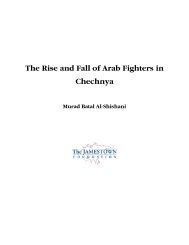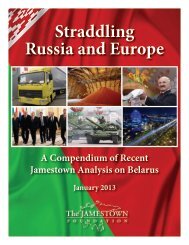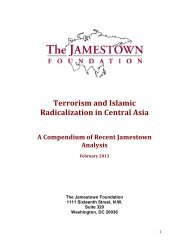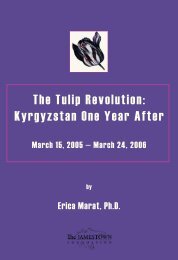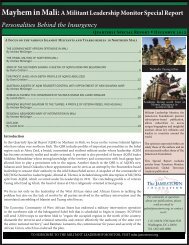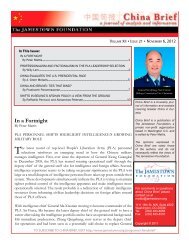By Brian Glyn Williams - The Jamestown Foundation
By Brian Glyn Williams - The Jamestown Foundation
By Brian Glyn Williams - The Jamestown Foundation
You also want an ePaper? Increase the reach of your titles
YUMPU automatically turns print PDFs into web optimized ePapers that Google loves.
An analysis of the Tatars' effectiveness in the Caucasus should begin with an examination of their<br />
opponents, the Persians. <strong>The</strong> Persian army consisted, for the most part, of Turkmen tribal cavalry. <strong>The</strong>se<br />
irregular warriors were drawn from the various Persian provinces and usually showed more loyalty to<br />
their tribal emirs than to the Shah. Shah Abbas attempted to overcome this dangerous situation during his<br />
reign by creating arquebus and artillery units loyal to himself. That the Persians could effectively use their<br />
firearms against a steppe opponent at even earlier dates can be seen by Shah Tahmasp's use of cannons to<br />
defeat the Uzbeks in 1528. 42<br />
<strong>The</strong> Persian army was first and foremost a cavalry force, despite these reforms, and the Tatars were in their<br />
element when fighting such an opponent. <strong>The</strong> Tatars fought effectively against the Persians on several<br />
occasions regardless of the Persian’s use of cannon. In 1578, for instance, a Tatar unit overran a Persian<br />
camp defended by both cannons and trenchworks. 43 Indeed, the Tatars frequently served as more than<br />
just light skirmishers and in several cases fought in pitched battles against larger Persian forces.<br />
<strong>The</strong> Crimean Tatars also served in their better known capacity as raiders, but their most valuable<br />
contribution on the Persian front was in defending the Ottomans ’ supply lines and baggage trains from the<br />
raids of the Persians’ swift Turkmen horsemen.<br />
<strong>The</strong> Tatar aid in the Caucasus, as on the other fronts, also had a dark side, and relations between the Ottomans<br />
and their wild Tatar allies were not always cordial. One of the main causes of conflict between the<br />
Ottoman commanders and the Tatars on the Persian front was the Tatars ’ predilection to pillage the<br />
population in territories under Ottoman control. <strong>The</strong> Tatars rarely differentiated between the peasants in<br />
newly conquered Ottoman territory and those in enemy lands. This often led to confrontations between<br />
Tatar leaders and the Ottoman generals who had been assigned the task of winning over the local<br />
populations to the Ottoman cause.<br />
<strong>The</strong> common Ottoman soldier also resented the fact that the Crimean Tatars usually received the lion's share of<br />
the booty at the end of the campaign season as a reward for their services. <strong>The</strong> Tatars' tendency to<br />
withdraw to the safety of the Crimea at the conclusion of every campaign season also caused<br />
resentment among the Ottoman troops who were left to garrison the Empire's new conquests. <strong>The</strong> Ottoman<br />
commanders no doubt realized that the Tatars had little value as garrison troops, but their departure was<br />
nonetheless bad for the moral of the Ottoman troops who had to remain and serve through the bitter<br />
winter months.<br />
<strong>The</strong> Ottoman leaders on the Persian front were also confronted with the problem of pressuring the Tatar<br />
Khans into participating in their campaigns at the beginning of every season. <strong>The</strong> Tatar Khans were often<br />
reluctant to send their forces off to fight in the Caucasus. <strong>The</strong> reasons for this were varied but stemmed, for<br />
the most part, from a hesitancy to leave the Crimea open to the attacks of the Cossacks and later the Russians.<br />
It must also be noted that the Crimean beys (chieftains) were also less inclined to participate in extended<br />
campaigns in regions that had already been impoverished as a result of previous campaigns.<br />
Despite these drawbacks, Osman Pasha, one of the Empire's greatest generals, obviously realized the value of<br />
the Tatar reinforcements as can be seen by his claim that "the only satisfactory means of holding the<br />
possessions newly acquired from Persia was to gain the full support and assistance of the Crimean Khan."<br />
Perhaps his qualified analysis should be the final judgment on the value of the Tatars ’ aid to the<br />
Ottomans on this front.<br />
14



